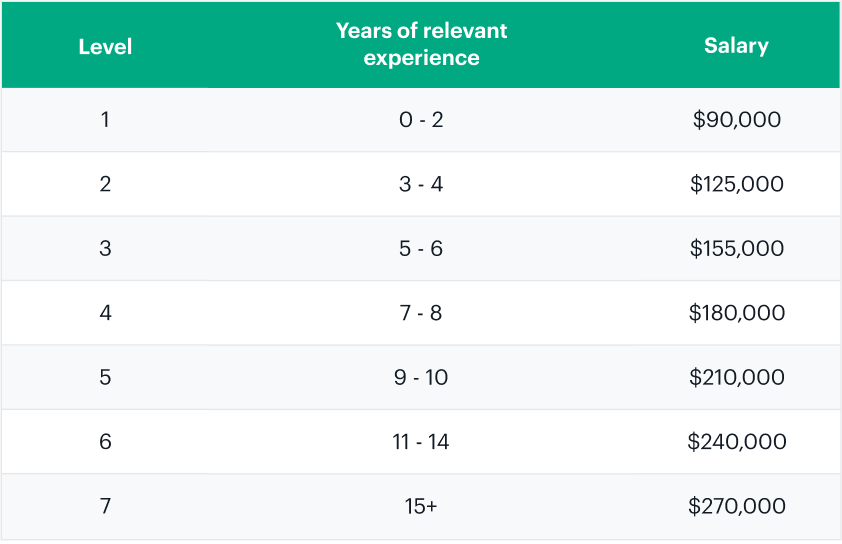Daily recently restructured our levels, promotions and salaries in somewhat unusual ways, and we want to share what we’re doing. We’re still early enough in our growth that we can’t compete with companies like Google and Netflix on salary alone. But we can be thoughtful in how we approach careers and compensation. Our new structure won’t work for many companies–in fact, we think it won’t work for us in perpetuity–but it has resonated deeply with our employees and with many candidates at this point.
In this post, I’ll:
- Give a summary of what we’re doing and why
- Go into detail on our thinking around levels, promotions and salaries
- Discuss some of the benefits and tradeoffs we can see now about the approach we’ve taken
- Share some of our teammates’ responses to our new system
TL;DR
Daily, where I’m VP of Engineering, is a WebRTC developer platform, providing video and audio APIs. The company, which has always been fully distributed, recently raised our Series B. We have around 50 people on staff, and for the past couple of years, we have leveled new employees based on years of relevant experience. We had three levels, each with a single, non-negotiable salary that was the same across locations, and everybody was assigned to one of those levels. We've always been completely remote – there isn't any home office for us – and we've always paid everyone the same everywhere in the world.
That general approach had been working for us. Candidates tended to like the straightforwardness of our offers, both in terms of level and salary. Staff tended to feel it was fair. And while lots of employees wanted more info on career growth, the lack of a formal career matrix wasn’t itself a complaint.
Recently, however, it became clear that we’d slipped out of sync with the market. In particular, salaries in tech have gone up sharply, and we wanted to be fair to current staff and competitive for new candidates. In reviewing our salaries, we could have set up a more traditional system, with salary bands and accomplishment-based promotions. Instead, we decided to stick with what was working and make adjustments that reflect our values and are a fit for our stage.
In short, we expanded from three levels to seven, better representing career growth. We assigned new salaries to each level (at each level, salaries are the same, regardless of employee location or function). And we instituted a promotion system in which people automatically bump up a level when they gain more experience at Daily. We also re-leveled current staff according to our new tiers and adjusted up any salaries where a new level paid more.
Here are our new levels and salaries:

Levels
As I said above, we’ve been using years of relevant experience to level new employees for a while, and we don’t anticipate changing that in the short term. But obviously, a big X factor here is what we consider to be “relevant.” There’s no perfect way to determine it, but we use the guidelines below to stay consistent and reduce the surface area for bias.
Thinking of applying to Daily? We talk in this post about how we level candidates, in part because we believe clarity in levels benefits us all. It’s also the case we strive to be consistent among staff on each team, and we haven’t included all of the details here about how we level every role. If you apply and we get to the offer stage, we’ll be actively interested in learning about your experiences—but we may count certain work as indirect to maintain fairness within our team. If we’re in that discussion with you, we’ll do our best to share all the information that informs our decision.
- We count a year of direct experience as a year of relevant experience, and a year of indirect experience as six months.
- Direct experience in our rubric means substantially the same type of functional work you'd do at Daily (coding, design, product management, etc.) or work in that career path (e.g., coding for EMs, product engineering for SREs, etc.). Details vary by discipline. For example, some departments emphasize experience specifically on commercial software teams while others look for different details. We aim to stay consistent within disciplines--so different things may count for, say, engineers and marketers. But the criteria look similar for all engineers, and we have a different set that look similar for all marketers.
- Indirect experience might include tech-sector work on a different career path (e.g., product marketing for PMs), tech-related work in a different sector (building a school’s website), or solo technical, non-commercial work (learning to code through app development). Again, for different roles, the specifics vary.
- We start counting years after formal schooling (high school or college).
- We try to take into account big gaps if people weren't working--but we also try to be generous.
At our size, titles aren’t particularly useful internally, and at any size, they can be divisive. So we haven’t associated titles with levels, though we will suggest titles for people to use on LinkedIn and resumes.
Promotions
Taken to its natural conclusion, leveling candidates based on years of relevant experience means we’ll also promote staff members for gaining relevant experience at Daily. We’ve decided to review everyone’s levels every six months and bump people up as they age into the next level. (In fact, we’ve already done the math for the next few years and shared anticipated advancements with people, assuming we continue this model) We aren’t using a traditional system in which people receive promotions based on perceived worthiness or achievements.
That said, we value individual growth quite a bit and very much want staff to grow in their careers at Daily! One way to think about this is that we're decoupling base salary (which we want to be predictable and fair as possible) from professional growth and recognition (both of which we want to be abundant). In the coming months, we aim to develop written guidance on what career growth looks like for different roles, and we'll start experimenting with rewards and recognition other than salary for particularly noteworthy achievements. We'll also have regular performance reviews, but raises won’t be tied to them.
Salaries
As I showed above, we’ve assigned a salary for each of our seven levels. We worked with a comp consultant who was able to provide market data for salaries, along with more recent trends she was seeing. We looked specifically at San Francisco salaries among companies that have raised a similar amount of money. Within this cohort, we wanted to be in at least the top half of salaries. Again, we’re at a stage where we cannot compete with Google, Amazon, et al on salary—but we are now paying competitively among our peers. Put another way, for people who are excited to work with companies at our stage, we’ve made it compelling to consider Daily.
This new system applies not only to candidates, but also to existing staff. When we reset everyone’s level internally, we also reset salaries to reflect our new scale. Nobody’s salary went down, and many went up. A few people were being paid above their new level, and we didn’t decrease their salaries. Other than that, we now have consistent fixed salaries across the organization. (The same is not yet true of equity grants. Because that’s a moving target and much more complex, we decided to tackle equity separately in the first half of this year. We didn’t want to hold up salary adjustments while we figure that out.)
It’s probably worth repeating that we pay the same everywhere, regardless of location. And we pay everyone at each level the same, regardless of function or role. That is, managers and individual contributors are leveled the same, as are product engineers and everyone else. For instance, an engineering manager and a product marketer with the same years of relevant experience are leveled the same and paid the same. (The exception here is salespeople, for whom we have a variable comp model in line with their expectations.)
Some things we like about our approach
Because using years of relevant experience is transparent and repeatable, both for leveling and promotions, it carries a strong measure of fairness. It means that we’re less likely to repeat and reinforce bias at job candidates’ previous companies that resulted in their being under-leveled. In addition, we are ourselves less likely to pay people different amounts than their peers for the same work, across categories like race and gender.
It also makes it easy for people to move between management and IC roles, or to try out a role in another department. That sort of movement is typically good for the organization and good for people’s growth, so this removes a barrier for something that’s mutually beneficial. Similarly, it doesn’t penalize people who do glue work and other things that they’re good at and that benefit the company.
Managers can spend time on things other than promotion proposals. In traditional promotion systems, managers have to spend time–often a lot of time–writing and/or reviewing promotion proposals. Never mind the fact that promotion decisions can be politically fraught and biased; the amount of time alone that managers typically have to spend on promotions pulls them substantially away from high value work, like improving team performance.
We are incentivized to communicate regularly and clearly about job performance. If everyone can get promoted simply by sticking around, managers have to be active in communicating with people who aren’t meeting expectations and helping them improve. Managers also have to be willing to let people go if they don’t show progress. (Staff members may get anxious as their promotion dates get closer–but we should be able to mitigate this by communicating with them consistently about their performance, good, great and otherwise.)
This wasn’t a driving factor, but it does increase our ability to predict staff costs, since we can see when people will get raises and by how much.
Some tradeoffs we can see (and what we’re doing about them)
The way we’ve set up our levels, people in the early stages of their careers can get bigger titles and raises more quickly at other orgs than they can at Daily. This will likely be a deterrent to some early-stage candidates, but we are ok with that for now. While we are excited to bring in early-career people once we have the structure to support them, we aren’t there yet, and probably won’t be for a while. We don’t want to make the mistake of hiring high-potential people we then under-serve, especially if they’re from groups typically excluded from tech.
That said, early-stage candidate pools tend to be more diverse than later-stage pools. To ensure diversity among candidates for more-senior roles, we’re doing things we know work–reaching out to our networks, advertising to affinity groups, developing inclusive practices across the board–and being patient to find the right candidates.
Some people are driven by external motivation and won’t want to work for a company that won’t promote them for tackling ambitious projects. We want Daily teammates to do work that they find personally rewarding. We try hard to ensure that new and existing staff work on projects where they can apply their existing expertise and that stretch them in interesting ways. At the same time, we don’t want to exploit people–which is why we’ve been proactive about resetting salaries. But we understand that we aren’t a fit for everyone.
We have some uneven leveling. Before we did the math to assign existing staff to our new levels, we knew it was likely that we’d wind up with people at the same level who don’t quite contribute the same amount. Because this is generally true at organizations that use traditional leveling and promotion systems–but for much less defensible reasons–we accepted that not everyone at each level would be fully equivalent.
Some desirable candidates won’t accept our offers based on salary, and to stay consistent on salaries and levels, we won’t have much leverage. Not being able to pay enough for great candidates is a common problem for startups, and we’ve already had to accept that some very strong potential teammates won’t even consider us, given enormous salaries at established tech companies. But by doing the legwork to make sure we’re competitive within our cohort, we believe we’ll have enough great candidates who want to work at a company of our stage and size.
Because we start counting experience after formal schooling, we give an advantage to people who don’t attend college. This is a small percentage of our staff and candidates, and we have accepted the imbalance.
This system is a good fit for us at this size and stage–but it likely won’t be a fit at every stage. We expect to review this in 12 to 18 months and will make adjustments that reflect changes in the market and/or our growth. That may incur some overhead, though we’d expect to have to review salaries periodically in any approach.
What Daily teammates think about the changes
When we rolled out our new system earlier this year, the most common thing we heard was that staff members appreciated the thinking and communication behind the changes–often more than the salary increases. These quotes are representative, and they’re from people at three different levels in the company.
“This kind of transparency and fairness (like non-engineers making as much as engineers; ICs and managers making equal amounts) are important to me. It's inspiring to see examples of good leadership like this. I'm very happy to be working at Daily with you and all our respectful, thoughtful colleagues.”
“I value working at a company where I don't feel like I have to advocate for myself, where work and experience are recognized and compensated without prompting and in a transparent way.”
“I am thrilled about the changes, and especially about the philosophy and values behind them.”
We’re excited that the changes have resonated with teammates, and we’re looking forward to growing with this system in 2022. We’ll likely learn about benefits and tradeoffs we haven’t foreseen, and we’ll report back as we find out more.

